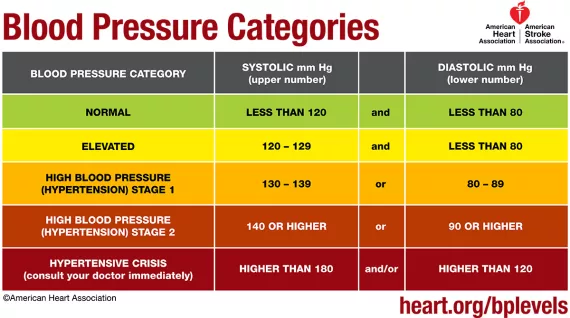Do I Have High Blood Pressure?

Blood Pressure is the force exerted on artery walls as it flows from the heart. Systolic and Diastolic blood pressure are both measured in millimeters of mercury (mm Hg). When your heart beats, it squeezes and pushes blood through your arteries to the rest of your body. This force creates pressure on those blood vessels, and that's your systolic blood pressure. A normal systolic pressure is below 120. The diastolic reading, or the bottom number, is the pressure in the arteries when the heart rests between beats. This is the time when the heart fills with blood and gets oxygen. A normal diastolic blood pressure is lower than 80. But even if your diastolic number is lower than 80, you can have elevated blood pressure if the systolic reading is 120-129.
The American Heart Association (AHA) includes five categorizes of blood pressure in the chart. The higher the level of blood pressure, the greater your risk for complications.
Managing High Blood Pressure is essential since persistent high blood pressure can lead to a variety of health problems, some of which can be life-threatening. Long-term high blood pressure is a major risk factor for:
- coronary artery disease
- stroke
- heart failure
- atrial fibrillation
- peripheral vascular disease
- vision loss
- chronic kidney disease
- dementia
In the United States, around 75 million people, or 29% of the population, have high blood pressure, according to the Centers for Disease Control and Prevention (CDC). So, how can you better manage my blood pressure? Here are some tips for managing your high blood pressure.
Need some extra assistance, try the Y's Blood Pressure Self-Monitoring Program! It's designed to help adults with hypertension lower and manage their blood pressure. The four-month program focuses on regulated home self-monitoring of one’s blood pressure using proper measuring techniques, individualized support and nutrition education for better blood pressure management.
BLOOD PRESSURE SELF-MONITORING PROGRAM
SOURCE: American Heart Association Health Threats From High Blood Pressure

